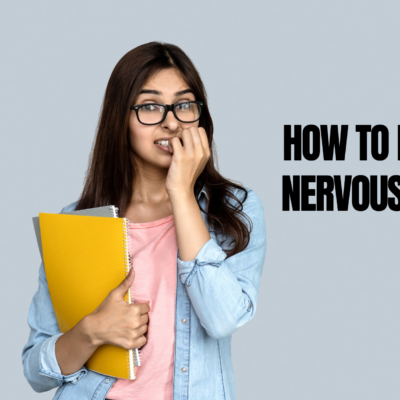How to Lower Nervousness: Nervousness is a common human experience that can arise in different situations, such as public speaking, job interviews, or even social gatherings. While it is common to feel nervous at times, constant nervousness can have a dangerous effect on both mental and physical well-being.
Also Read:
- What is Emotional Blunting and its Symptoms and Prevention?
- What are Social Phobia Causes and its Prevention?
- How to Heal Myself from Emotional Trauma?
- Gardening Benefits for Mental Health.
- Ways to Break Your Bad Mood. (in 15 minutes)
What Is The Root Cause of Nervousness
Before talking about specific techniques to relieve nervousness, it’s important to understand the root causes. Nervousness usually arises from fear of the unknown, performance anxiety, or a lack of confidence. Identifying these triggers is the first step toward managing and eventually overcoming nervousness.
How to Lower Nervousness?
Mindfulness and Meditation
One powerful strategy to reduce nervousness is the practice of mindfulness and meditation. These techniques include focusing on the present moment, developing self-awareness, and calming the mind. By including mindfulness in your daily routine, you can create a greater sense of control over your thoughts and emotions.
You can start with short meditation sessions, slowly increasing the duration as you become more comfortable. Deep, controlled breathing during meditation can help control your nervous system and relieve anxiety.
Visualize Positivity
Harnessing the power of positive visualization is another effective way to reduce nervousness. Instead of imagining potential negative outcomes, visualize yourself succeeding and feeling confident in the given situation. This technique helps your brain to concentrate on positive possibilities, decreasing anxiety and encouraging a more optimistic mindset.
Before facing any event, take a few moments to vividly imagine yourself performing well and managing the situation with ease. This mental rehearsal can improve your self-confidence and reduce nervousness when the actual moment comes.
Preparation and Knowledge
One important contributor to nervousness is a lack of preparation. Whether it’s a presentation, an exam, or a social event, thorough preparation can increase your confidence and decrease anxiety. Take the time to research, practice, and educate yourself with the subject matter or the event’s context.
Create a detailed plan, and practice your speech or performance multiple times. The more you prepare yourself, the more in control you will feel, reducing nervousness and improving your chances of success.
Physical Exercise
Engaging in regular physical exercise is not only helpful for your overall health but also plays an important role in handling nervousness. Exercise releases endorphins, the body’s natural stress relievers, which can greatly improve mood and decrease anxiety levels.
Make an exercise routine that suits you, whether it’s jogging, yoga, or weightlifting. Consistency is key, as regular exercise helps create a stable foundation for emotional well-being, making it easier to deal with nervousness when it arises.
Progressive Muscle Relaxation
Progressive Muscle Relaxation (PMR) is a process that includes systematically tensing and then relaxing different muscle groups. This method enables the release of physical tension and encourages a sense of relaxation throughout the body. By intentionally relaxing each muscle group, you can train your body to react more calmly to stressors.
To practice PMR, start by tensing and then gradually releasing tension in each muscle group, working your way from head to toe. This simple yet effective exercise can be done anywhere, it will provide an immediate sense of physical and mental relief.
Have Supportive People Around
Having a dedicated support system can greatly contribute to decreasing nervousness. Share your concerns and feelings with friends, family, or colleagues who can deliver encouragement and outlook. Sometimes, expressing your worries out loud can provide a sense of relief and help you gain useful insights.
Additionally, surround yourself with positive results and people who inspire confidence.
Set Realistic Goals
Setting realistic and attainable goals is important for handling nervousness. Break down bigger tasks into smaller, more effortless steps, allowing yourself to celebrate small victories along the way. This method helps control feeling overwhelmed and promotes a sense of achievement, increasing your overall confidence.
By setting realistic goals, you create a roadmap for success, decreasing the pressure and nervousness connected with larger challenges.
Develop a Growth Mindset
Embracing a growth mindset is important for decreasing nervousness, particularly in times of setbacks or challenges. Instead of viewing difficulties as impossible obstacles, see them as opportunities for learning and personal growth. Adopting a growth mindset enables strength, perseverance, and a positive outlook.
Develop the belief that your abilities and intelligence can be acquired through effort and dedication. This mindset shift can greatly impact how you approach challenges, decreasing nervousness and promoting a more adaptive and constructive attitude.
At The End
Reducing nervousness is a slow process that needs self-awareness, practice, and a commitment to personal growth.
Remember that we all experience nervousness to some extent, and it’s a normal part of the human experience. The key is to create coping mechanisms that work for you, which let you handle challenging situations with confidence and composure. With patience and persistence, you can build strength and change nervousness into a stepping stone toward personal and professional success.








